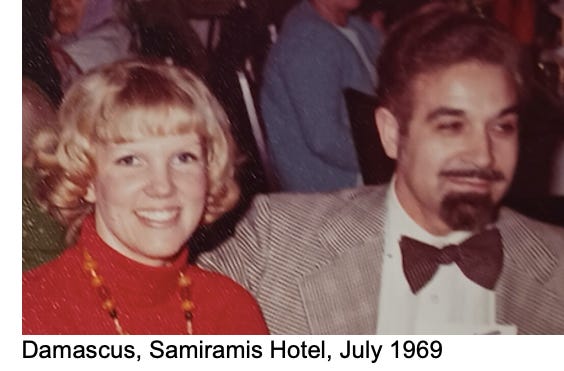In the summer of 1969, my husband, Ribhi and I, along with our two children, went to Damascus. We had finally delivered the ambulance to the Lebanese Red Crescent, and we were off to visit his family. The Baath Party already controlled Syria (and was the primary party in Syria until two days ago).
The final week we were there, in July 1969, we hired a taxi to take us to Damascus to see where his parents lived and to visit relatives. There was no six-lane highway into Damascus then and no border patrols either. Vehicles left Beirut, driving past some beautiful small villages like Zahle, and over the mountain on a two-lane highway. It would take four hours with a stop at several places to eat along the way. vendors clamoring for our business at the small wayside restaurants. Ribhi and the kids wanted to stop at every one of them, just to see what the food tasted like. I was not so willing to put things in my mouth when I didn’t know their origin (I got over that Mid-Western attitude after that first trip.) As the kids munched on falafel and looked out the window, we saw donkeys trudging along the sides of the road, villagers who waved at us, little boys herding goats, and the occasional camel off in the distance.
When his parents fled in 1948, they had joined almost 100,000 Palestinians fleeing Israeli massacres to immigrate to Syria. At the time, Syria was headed by Shukri al-Quwatli who fought the French after WW I and was sentenced to death by them, but fled to Egypt instead until he was called back to Syria to serve as President. I realized I was in for the education of my life that summer, and I’ve never forgotten the stories I was told.
His parents and brothers lived in Yarmouk Camp in Damascus, but it wasn’t a refugee camp at all, not like the tents I’d seen in the Bekaa Valley we had visited. It was a modern section of Damascus, opened in 1957, filled with Palestinians of all kinds, from doctors and lawyers to street vendors. His family occupied the entire top floor of a five-story building.
Three sons (all engineers) and a daughter (a professor) worked and lived outside Damascus making their parent’s lives quite comfortable. Syria had set up a set of laws for them from the very beginning. Although most still held Palestinian citizenship (although if they left Syria, they traveled on a laissez-passer, since they had no passports), they had the right to own more than one business, as well as the right to lease properties. They could join a union and travel throughout Syria. Ribhi’s two half-brothers were in school, one in dental school and one in engineering school. The Syrian government paid all their expenses.
I learned all of this information from Ribhi after he’d spent three days talking to the family, worried that the information we’d gotten through US media meant they were somehow marginalized and demonized, huddled in squalor and worried for their lives. It simply wasn’t true.
We ate, we laughed, we ate some more, we talked (OK, I listened, they talked), and they reminisced about their home in Safad and what it had been like growing up there. I learned that Ribhi had been a soccer player, one of the best in Palestine before 1948. His parents kept saying to me. “lays ladayna suar, nahn asfun” (we have no photos, we are sorry) The week flew by.
On that final day, we loaded up our belongings and every gift we received and sadly departed, heading back down the mountain and straight to the airport in Beirut. It would be another five years before we returned.




I love hearing your memories of your life. You and Ribhi were a handsome couple.
Thinking about the point of this story, that Syria actually helped and accommodated the refugees, is another point in many that demonstrate that government had always opposed Israel and the US backing of it. They just didn’t play ball with Israel, which I admire, but it led eventually to the US overthrow. Yet another US over throw, not because of the regime, but because Israel and the US want to install a proxy and take over the country. Yet people are naive enough to celebrate.
This is Rochelle, by the way.
The mainstream media, over the decades, has proven themselves to be the tellers of deception and misinformation. Your eyewitness accounts clearly humanizes the needed reality that gives us hope in this joined fight we share.